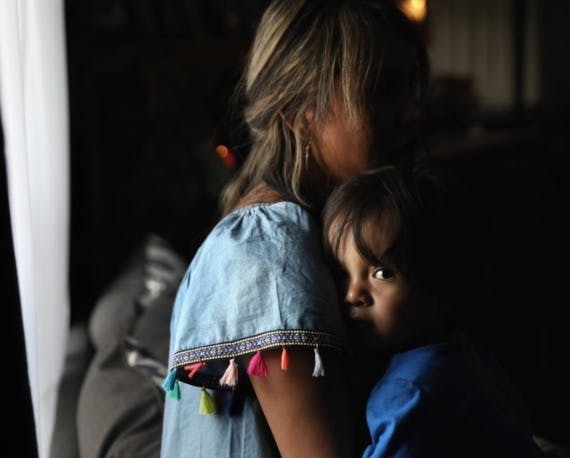An End to DACA: Helping Children Manage Stress and Anxiety
Interview conducted by Mary Kelly Persyn for EmbraceRace

The daughter of unauthorized immigrant parents stands next to a sign outside the Miami-Dade County building. Credit: Alan Diaz, AP.
Deferred Action for Childhood Arrivals (DACA) is a 2012 executive order that enabled undocumented people who arrived in the United States before the age of 16 to register for temporary protection from deportation and for a work permit, renewable every two years.
On Monday, President Trump announced via Attorney General Jeff Sessions that the program has been discontinued. DACA protections will not be withdrawn for any recipient, but after March they will not be renewed unless Congress takes legislative action.
We at EmbraceRace are very aware that this decision will lead to tremendous anxiety for many children. We turned to San Francisco’s Center for Youth Wellness (CYW) for advice about how parents and caregivers can help children and youth navigate this issue. I sat down with Dr. Lisa Gutierrez Wang, CYW’s Director of Clinical Programs, to get her wisdom.
EmbraceRace: Lisa, thank you so much for spending time with EmbraceRace today. The DACA announcement has resulted in some confusion, uncertainty, and anxiety for kids and their parents and teachers. How much should we share with children and youth about this decision?
Dr. Gutierrez Wang: That will differ based on the child’s age, developmental stage, level of awareness, and connection to the decision. We want to address their questions, but also instill a sense of security, empowerment, and hope.

Dr. Lisa Gutierrez Wang.
We at CYW recommend that parents start by asking questions and listening carefully to how the child responds. Try to come from a place of curiosity. It’s important to begin with open-ended questions to get a better sense of what the child is hearing and understanding, and then parents can provide appropriate support. You may start with:
- "What have you heard about DACA?"
- "Where did you hear it? On the news? From teachers and friends?"
- "What are you thinking?"
- "How do you feel? How does this affect people close to you, like family members and friends?"
It’s important to have the conversation when you have the child’s attention and you have time to listen to the answers. Once you understand what your child has been hearing, encourage questions.
- "What do you want to know?"
- "What are you curious about?"
Respond as best you can as a caregiver, and acknowledge when you don’t know. You can offer to do some research with the child, or make some inquiries yourself and come back to the child with what you’ve found. The important part is to show you are committed to supporting the child and working on this together.
For families directly impacted by the decision, there are next steps. We at CYW talk about emergency planning with our families. We go through all the resources available to them, including whom they should get connected to for legal advice.
Great resources are available, including the National Immigration Law Center and the Immigrant Defense Fund. In San Francisco, we refer to San Francisco Immigrant Legal and Education Network (SFILEN). It includes 13 organizations, speaking over 20 languages and dialects, that provide services, legal assistance, and education to low-income immigrants in the City.
These organizations have created great emergency planning toolkits and templates parents can use to do detailed planning for childcare and medical needs in case they are detained. We connect families to these resources and then help them to make complete plans and share them with the children.
Parents are buffers for major life stressors, so it’s important to provide the plan with reassurances that help kids feel more confident in answering questions, including: Who is my natural support system? Who would pick me up from school? We tell families to make sure the school has the names and numbers of whom to call and to communicate that information to children in age-appropriate ways.
EmbraceRace: That’s so helpful. How can parents learn more about what’s age-appropriate?

Children of an unauthorized immigrant parent stand with their mother. Credit: Aaron Bernstein, Reuters.
Dr. Gutierrez Wang: We recommend starting with open-ended questions and then following the child’s lead. The child will demonstrate the level at which they’re ready for information, and then parents can use their child’s language in the responses. Resist the desire to over-explain, or give children more information than they’re capable of taking on. Be concrete with little kids, and broader and more conceptual and political with older kids.
Here’s an example of how we recommend parents talk to small children: There are many things going on that can seem scary. Have you heard anything that you have questions about? The ideas and language the child uses will guide you. Acknowledge that this is hard and remind kids that your main job is to keep them safe. For older children, look for ways to empower them and let them know what role they can play on a national scale.
EmbraceRace: Would the racial identity of the child make a difference to your advice?
Dr. Gutierrez Wang: There is a component when you put it into the larger national context. For children of color, you could name specifically how this development with DACA may be connected to issues of race or racism in our culture. Again, it’s important to listen to and be guided by the child. Answer with additional information that builds your child’s sense of hope, safety, and empowerment.
EmbraceRace: That’s really helpful. What if your kid expresses anxiety about another child?
Dr. Gutierrez Wang: Parents should acknowledge the child’s fears — name the feelings and enable a conversation about them. Reiterate your role as the caregiver and someone who will hold these conversations and think through things with them.
Where this issue impacts specific relationships, have a conversation about how your child and your family might support the friend. If you have a relationship with the friend’s family, reach out to ask how you can be supportive to the family and how you might fit into their emergency plan. You can also get connected to other families through the school and think about how you can engage with the community to provide support.

Infographic describing the intergenerational effect of DACA on children’s mental health. Credit: Noelle Daly, Stanford Immigration Policy Lab
EmbraceRace: Given that the DACA repeal directly affects mostly people of color, what if the child asks if there’s something wrong with them, or the color of their skin?
Dr. Gutierrez Wang: It’s so important to simply say, nothing is wrong with you. You can tell the child that this is a confusing time, that many people are confused and some are scared. Label the feelings and provide language around them, but reiterate your role as the primary caregiver and the person able to talk with them about the scary feelings. For very small children, start there. For older kids who want to talk about race/racism and why these things happen — again, it depends on the child’s age and developmental level.
In everything, the child’s safety comes first. Parents can share with children that we recognize that our country is very diverse, with many points of view, and with DACA there are many conversations and decisions still to be made — but we are committed to keeping you safe.
EmbraceRace: How can parents judge whether the anxiety and fear their children might be experiencing calls for outreach to the family pediatrician?
Dr. Gutierrez Wang: At CYW, we believe that families should always start with the pediatrician if there are medical or behavioral issues you worry about.
What to look for: symptoms that affect the child’s daily functioning. That’s age-dependent, but if a kid has previously been able to go to school, play with friends, eat well, sleep well, but now they have stomach aches, can’t eat or sleep, are not able to do normal activities, they don’t have the energy they had before — that’s a sign that additional support may be needed. That’s when to come in to talk to pediatrician.
Talk about your child’s anxiety and stress and name the impact on different aspects of the child’s functioning. The pediatrician will evaluate for medical issues to rule out, and then connect families to other resources for support. That might be a referral to legal assistance, a counselor or therapist who can help have these difficult conversations, or practice techniques for handling stress.
EmbraceRace: What’s your advice for the best way to build confidence and resilience around the DACA decision?
Dr. Gutierrez Wang: Start with the idea that there are safe places to express feelings, and that children can always start with their primary parent or caregiver. Supportive relationships are always the key to confidence, self-esteem, all of it. That stable, secure relationship provides a buffer for all kinds of stressors and adversities kids face.

An undocumented immigrant from Peru shown with one of her two children. Credit: John Moore/Getty Images
But recognize that caregivers need their own support network! Find who you can turn to for support, information, assistance with childcare, and so on so that you can remain an effective caregiver for your children. We are all interconnected; those relationships have to be there in order to thrive.
In addition to highlighting the importance of relationships, other ways to build resilience are good sleep, nutrition, physical activity to manage stress in the body, and mindfulness practices — ways to slow down the mind and body to be able to do the communication and problem solving necessary for navigating through difficult situations like this one. CYW always focuses on helping children and families regulate the stress response through this range of strategies.
Parenting is stressful! Don’t forget to find your own support network so you can keep being an amazing parent to your child. Kids pick up on our stress as well, so seeking support is not selfish — it benefits us and ultimately, our children.
EmbraceRace: Lisa, from the bottom of our parenting hearts here at EmbraceRace, we thank you and the Center for Youth Wellness so much for all the time you’ve spent with us today. Be well.
Mary Kelly Persyn



